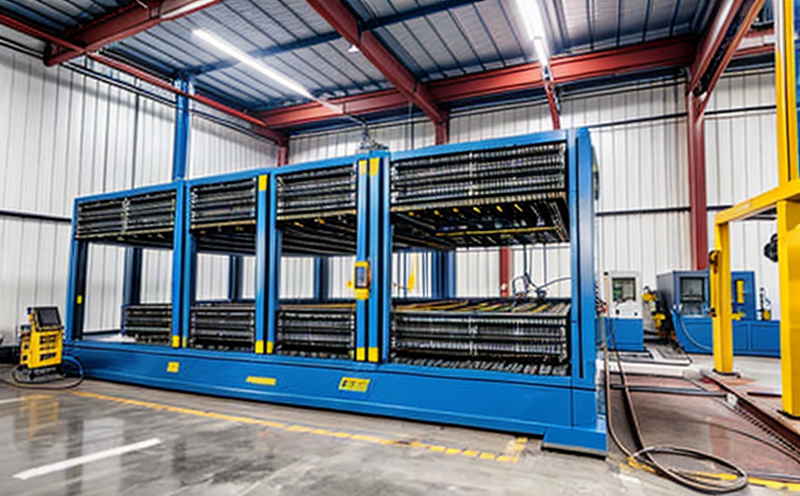Mechanical Stress Testing
Unlock the Secrets of Your Materials with Mechanical Stress Testing Boost Efficiency, Reduce Risk, and Ensure Quality
In todays fast-paced industrial landscape, manufacturers are constantly seeking ways to optimize their processes, reduce costs, and improve product quality. One crucial laboratory service that can help businesses achieve these goals is mechanical stress testing. Conducted by experts at Eurolab, this comprehensive analysis evaluates the durability and performance of various materials under different mechanical loads.
What is Mechanical Stress Testing?
Mechanical stress testing involves subjecting samples to various types of mechanical stress, such as tension, compression, bending, or torsion, to assess their resistance to deformation or failure. This non-destructive technique simulates real-world conditions, providing valuable insights into a materials behavior under different loads.
Why is Mechanical Stress Testing Essential for Businesses?
With the increasing demand for high-quality products and the growing need for efficient production processes, mechanical stress testing has become an indispensable tool in various industries. Here are just a few reasons why this service is essential
Improved Product Reliability By simulating real-world conditions, mechanical stress testing helps manufacturers identify potential weaknesses in their materials or designs. This information enables them to make informed decisions about product development and reduce the risk of costly recalls.
Enhanced Efficiency By optimizing material selection and design for specific applications, businesses can streamline their production processes, increase productivity, and ultimately save time and money.
Compliance with Industry Standards Mechanical stress testing is often a regulatory requirement in various industries, such as aerospace, automotive, or construction. Companies that comply with these standards demonstrate their commitment to quality and safety.
The Advantages of Using Mechanical Stress Testing
Here are the key benefits of incorporating mechanical stress testing into your material evaluation process
Accurate Material Selection Mechanical stress testing provides detailed information about a materials properties, enabling businesses to choose the most suitable materials for specific applications.
Design Optimization By understanding how materials behave under different loads, manufacturers can design products that are more efficient, durable, and cost-effective.
Reduced Warranty Claims With mechanical stress testing, companies can identify potential weaknesses in their products and take corrective action before they reach customers. This reduces the likelihood of warranty claims and associated costs.
Compliance with Regulations By performing mechanical stress testing, businesses demonstrate their commitment to regulatory compliance and reduce the risk of non-compliance fines or penalties.
Key Benefits at a Glance
Increased Product Reliability
Enhanced Efficiency
Improved Design Optimization
Reduced Warranty Claims
Compliance with Industry Standards
Accurate Material Selection
Frequently Asked Questions about Mechanical Stress Testing
Q What types of materials can be tested using mechanical stress testing?
A A wide range of materials, including metals, plastics, composites, and ceramics, can be evaluated using mechanical stress testing.
Q How is mechanical stress testing conducted at Eurolab?
A Our experienced technicians use a variety of equipment, including universal testing machines, torsion testers, and compression testers, to simulate different types of mechanical stress.
Q What are the benefits of mechanical stress testing compared to other laboratory services?
A Mechanical stress testing provides more detailed information about material properties than other laboratory services, enabling businesses to make informed decisions about product development and design optimization.
Q Can mechanical stress testing be used for destructive or non-destructive testing?
A While some types of mechanical stress testing can be destructive, many methods are non-destructive, allowing samples to be tested without damage.
Q How long does a typical mechanical stress testing project take at Eurolab?
A The duration of a project depends on the specific requirements and complexity of the test. Our experienced technicians work efficiently to ensure timely completion while maintaining accuracy and quality.
Conclusion
Mechanical stress testing is an indispensable tool for businesses seeking to optimize their processes, reduce costs, and improve product quality. By evaluating materials under different mechanical loads, manufacturers can identify potential weaknesses, design more efficient products, and demonstrate regulatory compliance. At Eurolab, our experts are committed to providing accurate and timely results that help companies make informed decisions about material selection and design optimization.
Dont miss out on the benefits of mechanical stress testing contact us today to learn more about how this laboratory service can transform your business!
-
Testing the mechanical durability of consumer products under stress conditions
-
Simulating pressure, bending, and stretching to evaluate how products perform under mechanical load
-
Assessing the tensile and compression strength of consumer goods to prevent structural failure
-
Testing for cracks, deformations, and material fatigue under prolonged mechanical stress
-
Evaluating how consumer products react to forces like twisting, pulling, and pushing
-
Simulating real-world mechanical stresses to test product reliability in everyday use
-
Testing for failure points or weakness in critical components of consumer goods under stress
-
Assessing how different materials used in products perform under mechanical loading
-
Evaluating the long-term effects of repeated mechanical stress on product lifespan
-
Testing the ability of consumer products to withstand physical manipulation and heavy use
-
Simulating mechanical stress in environments where products are exposed to varying pressures or forces
-
Testing the mechanical integrity of products designed to withstand extreme use, such as tools or sports equipment
-
Evaluating the failure modes of products when exposed to excessive forces
-
Assessing the performance of locking mechanisms, latches, and other components under mechanical stress
-
Testing for bending or breaking points in products like chairs, tables, and kitchenware
-
Verifying product safety and functionality under mechanical loading conditions
-
Assessing the impact of stress on non-visible components of the product, such as internal wiring
-
Testing for early signs of wear or breakage in products subjected to mechanical forces
-
Simulating common real-life scenarios that involve mechanical stress on consumer goods
-
Ensuring that products meet durability standards when subjected to mechanical challenges




